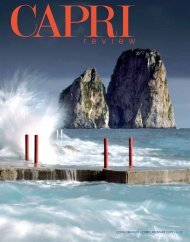COPIA OMAGGIO ⢠COMPLIMENTARY COPY EDIZIONI PRC
COPIA OMAGGIO ⢠COMPLIMENTARY COPY EDIZIONI PRC
COPIA OMAGGIO ⢠COMPLIMENTARY COPY EDIZIONI PRC
You also want an ePaper? Increase the reach of your titles
YUMPU automatically turns print PDFs into web optimized ePapers that Google loves.
Lo scrittore francese sessualità, che creerà<br />
fotografato nella sua<br />
abitazione nel 1984. non pochi imbarazzi<br />
Sopra, Villa Lysis. ai suoi familiari.<br />
La costruzione si trova<br />
sulla strada che conduce Figlio unico di una<br />
a Villa Jovis.<br />
famiglia dell’alta borghesia<br />
di Castres, nel<br />
The French writer<br />
photographed at his<br />
home in 1984. Above,<br />
Villa Lysis. The house sud est della Francia,<br />
is located on the road Peyrefitte era nato<br />
leading to Villa Jovis.<br />
nell’agosto del 1907.<br />
Studiò dai gesuiti e si laureò prima in lettere<br />
e poi in scienze politiche, per intraprendere<br />
la carriera diplomatica. Come prima sede ottenne<br />
Atene, dove lavorò dal 1933 al 1938.<br />
Di quell’esperienza ci lascerà un romanzo<br />
folgorante, Ambasciate, in cui rivelerà nefandezze<br />
e perversioni dell’alta diplomazia e per<br />
il quale subirà l’ennesimo processo.<br />
Tornato in Francia, prestò servizio al ministero<br />
dell’Interno, ma durante il governo di<br />
Vichy fu accusato di collaborazionismo ed<br />
esonerato dal lavoro, accusa poi dimostratasi<br />
infondata. Decise allora di dedicarsi completamente<br />
alla narrativa, eleggendo l’Italia<br />
a sua patria ideale e spostandosi per lunghi<br />
periodi tra Capri e Taormina. Anni prodigiosi<br />
e produttivi, una vita tesa al raggiungimento<br />
del suo libero ideale di vita, durante i<br />
quali lo scrittore creerà ben 17 romanzi.<br />
«L’Italia mi ha stregato, scriveva. È il solo<br />
paese dove si gusta ancora la gioia di vivere.<br />
Nessun popolo ha ereditato una così solare<br />
civiltà». E Capri era l’apice di questo idillio<br />
perenne, il luogo in cui immergersi nella natura<br />
e nella totale liberazione degli istinti.<br />
Sulle tracce di Fersen<br />
L’isola azzurra dei primi anni Cinquanta era<br />
frequentata da nobili decaduti e spiriti bizzarri,<br />
coppie eccentriche impegnate a vivere<br />
la propria passione alla luce del sole. Dopo i<br />
“capresi d’elezione” come lo scrittore scozzese<br />
Norman Douglas, il medico svedese Axel<br />
Munthe e il famoso impresario di balletti<br />
Sergej Djagilev, che avevano fatto la storia<br />
di Capri dei primi decenni del Novecento,<br />
altri personaggi la stavano invadendo, per<br />
dar vita agli effervescenti anni Cinquanta e<br />
Sessanta.<br />
<br />
M. MASTRORILLO<br />
THE WRITER WHO<br />
DEFIED CONVENTION<br />
by Giuseppe Mazzella<br />
Peyrefitte scandalized Europe<br />
and worshipped Capri as the<br />
“kingdom of happiness”.<br />
To live a life of utter freedom in the “land<br />
with no rules”: this was the dream of<br />
French writer Roger Peyrefitte when<br />
he disembarked on Capri for the first time.<br />
It was the spring of 1957. His official reason<br />
for the trip was to do research into the life<br />
and mysterious death of Count Jacques<br />
d’Adelsward-Fersen forty years earlier,<br />
and speak to people who had known him.<br />
Peyrefitte’s idea was to write a fictionalized<br />
biography of the count. He also happened to<br />
be in flight from the rumours surrounding his<br />
broken engagement to a high-society French<br />
woman; moreover, quite a scandal had<br />
erupted over the publication of his novel Les<br />
amitiés particuliers, which had rocked Europe<br />
and made Peyrefitte’s name as the author of a<br />
cult novel for homosexuals.<br />
Published in 1941 and reprinted a few years<br />
later, the novel had cost its author a trial on<br />
the grounds of its alleged immorality; the trial<br />
ended, nevertheless, in an acquittal. Peyrefitte<br />
would later write: “I have a weakness: I love<br />
truth; I cultivate it and express it. And truth will<br />
always sting, stir up scandal, and lead to a<br />
lawsuit or two. Now I have been tried several<br />
times, but I have never lost a case, which<br />
means that the truth will out, in the end. This<br />
is the sole reason for all the scandal.”<br />
That story about the “Greek love” between<br />
two high school students, with its tragic<br />
denouement and its inspiration in an incident<br />
from the writer’s own life, had revealed all<br />
the potential risks of an overly strict religious<br />
education, inadvertently leading youths<br />
astray. It was during Peyrefitte’s troubled<br />
adolescence, in fact, that he discovered his<br />
own homosexuality, a source of no small<br />
embarrassment to his family.<br />
The only child of a well-to-do family in<br />
Castres, in southeast France, Peyrefitte was<br />
born in August 1907. He received a Jesuit<br />
education and completed two degrees, first<br />
in literature and then political science, before<br />
embarking on a diplomatic career. His first<br />
posting was Athens, where he worked from<br />
1933 to 1938. This experience would produce<br />
an electrifying novel, Les Ambassades, in<br />
which Peyrefitte unveiled the perversions<br />
and iniquities of the high-ranking diplomatic<br />
circles; a trial inevitably followed.<br />
Upon his return to France, the writer went to<br />
work at the Ministry of Internal Affairs, but<br />
during the Vichy regime he was accused of<br />
collaborationism and dismissed from his post;<br />
the charge was later shown to be groundless.<br />
Peyrefitte then decided to devote himself<br />
entirely to writing novels, electing Italy<br />
<br />
95



